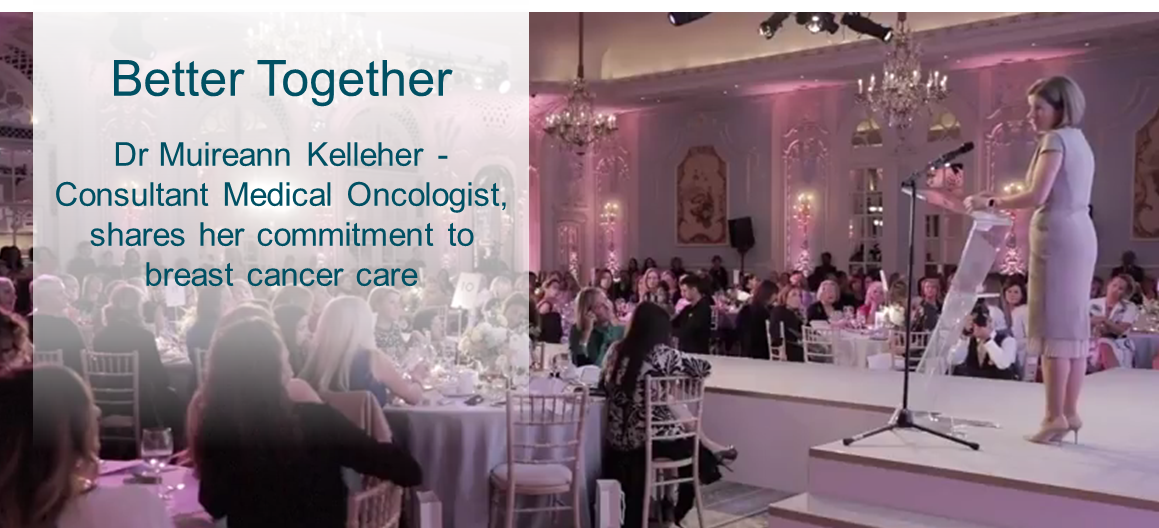For assistance call us on: 020 3925 9624 Email us
- Conditions We Treat
- Diagnostics
- Treatment
- Support Services
- Find a Consultant
- About CCL
- Contact Us

Dr Kelleher, Consultant Medical Oncologist, was recently a guest speaker at Future Dreams' 'United for Her' ladies lunch at The Savoy. Dr Kelleher shared her commitment to breast cancer care and the benefits of a support centre to harness the support of peers.
“I have an amazing job. I get to meet extraordinary women every day. Women experiencing a dreadful, unwelcome usually unexpected visitor in their already complicated lives. Often starting off filled with fear and questions – a tough time. I don’t want to dwell on the treatment. No one has it easy. It is not ‘breast cancer light’ to avoid chemo, the number of involved nodes does not top trump node negative breast cancer. Every woman suffers on her cancer journey.
I want my patients to be the very best version of themselves that they can be after breast cancer; loving and living life to the fullest extent possible. Breast cancer can help women to make positive, active decisions about their lives, bringing things into sharp focus. An awareness and perspective of one’s own mortality may give women a sense of empowerment. Understanding that time is not infinite can propel us all to change relationships and marriages that have been coasting alone or enhance relationships previously lacking.
Patients think friends will support them when the chips are down. It is the hidden gems that surprise: the neighbour, the colleague or acquaintance that picks up the kids, or cleans out the fridge. Communities are enhanced by the presence of a support centre – literally a place for people to meet and help each other. Future Dreams House, home to Breast Cancer Haven is a great example of the way in which patients can harness the support of their peers and alleviate the strain on an already-strained NHS.
Women should return to their treatment team with a medical concern. For some, the struggle may be so great they require psychological or even psychiatric support, but a hospital environment doesn’t help everyone to move forward. Conversely, it returns a woman into the role of patient, physically returning to a clinic room with negative associations, a bad news space. With your help there will be another, better, place for a woman to take her non-physical concerns.
Many women like to talk and to share their experiences. A clam, positive environment in which to do this aids the process of recovery. A safe space in which positive things happen and crucially no bad news is delivered.
The best outcome of breast cancer diagnosis and treatment is that a woman will not just survive but will have learned something about herself as a result of her illness. In my experience, this happens more typically when the woman has access to a supportive environment.
I do try my utmost to support patients but I am asked questions, on a daily basis that I am unable to answer:
I’ve just stared a new job – can they fire me?
Do I have to tell all the other parents at school?
What are the dating rules?
A pop up centre has countless function and discussing and responding to questions like these, amongst women who are experiencing similar dilemmas, is a key function of such a space. Breast cancer is a great leveller – it does not discriminate. The universality of that experience can be an extraordinary means of bringing women together. Women who would never otherwise have met and have much to share. An inclusive support centre enables different women from different communities to help each other. There will be a space for every kind of woman here: multicultural and blind to the divisions of money or class, like the disease itself.
Future Dreams House will be all inclusive, from the woman struggling even to find her bus fare to attend the centre, to the woman who simply doesn’t want further to distress her family. There should and will be room for everyone.
Positivity and a strong mental attitude can’t cure cancer, but they do give each woman the tools to withstand the difficulties that she will face on a daily basis: the trauma of hair loss, combatting the side effects of tamoxifen, the repercussions of a mastectomy.
A support centre provides a forum in which women can express their distress and move forward, feeling more resilient and – perhaps more importantly, feeling less alone.
Sadly, for some of my patients, breast cancer is not the worst thing to have happened in their lives. They need this support all the more. I have a patient with metastasised breast cancer who is living with her family in a B&B. It is unlikely that this family will be re-housed in her lifetime. Her kids go to school, her husband goes to work. She would benefit hugely from the respite of a support centre. Even for two hours a week. Somewhere to go that is just for her.
Subsidised travel and taxi fares
A new scarf to mask the hair loss
A massage
Somewhere to go where everyone understands how you feel
A focus on alternative approaches
Each and every one of these things makes a real and tangible difference to the process of recovery for a woman in the aftermath of her breast cancer diagnosis. Some of this might sound nebulous, but if even one woman’s experience is improved then your money has been well spent.
I never met the founders of this charity but I know that support for other women with breast cancer was at the forefront of their minds when establishing Future Dreams.”
Watch Dr Kelleher's talk here:
Reference: words by Dr Muireann Kelleher during her guest speech at Future Dreams' 'United for Her' event – FutureDreams.org.uk
